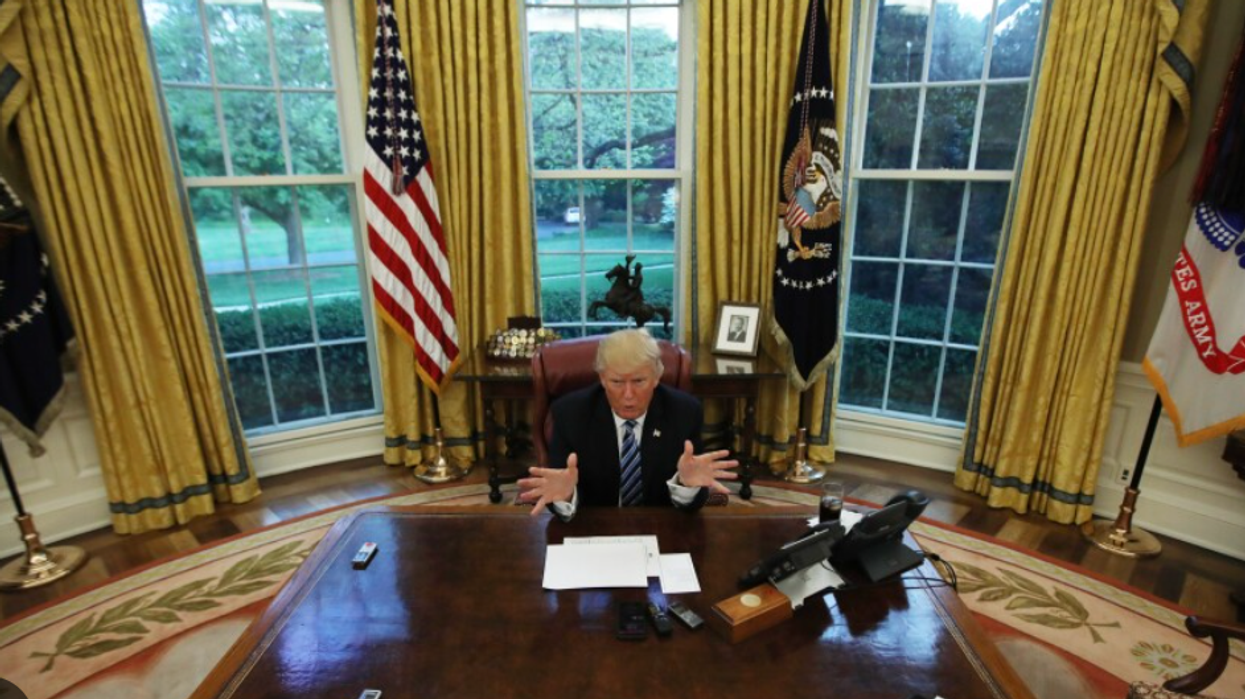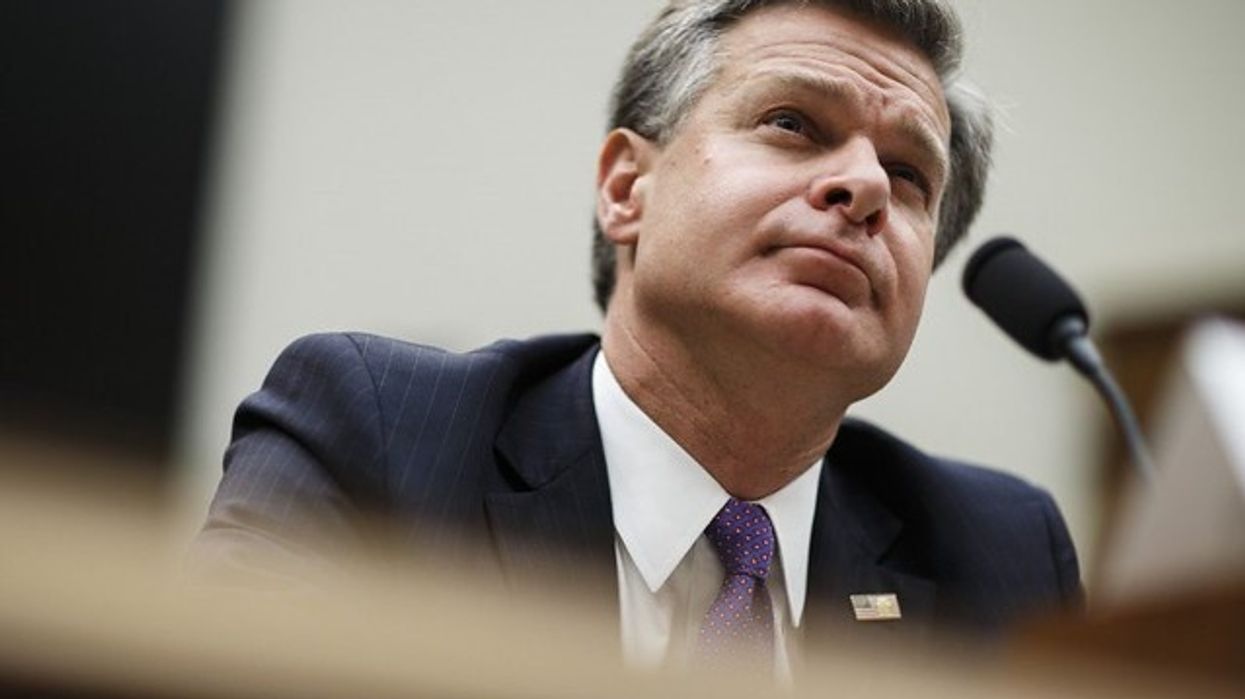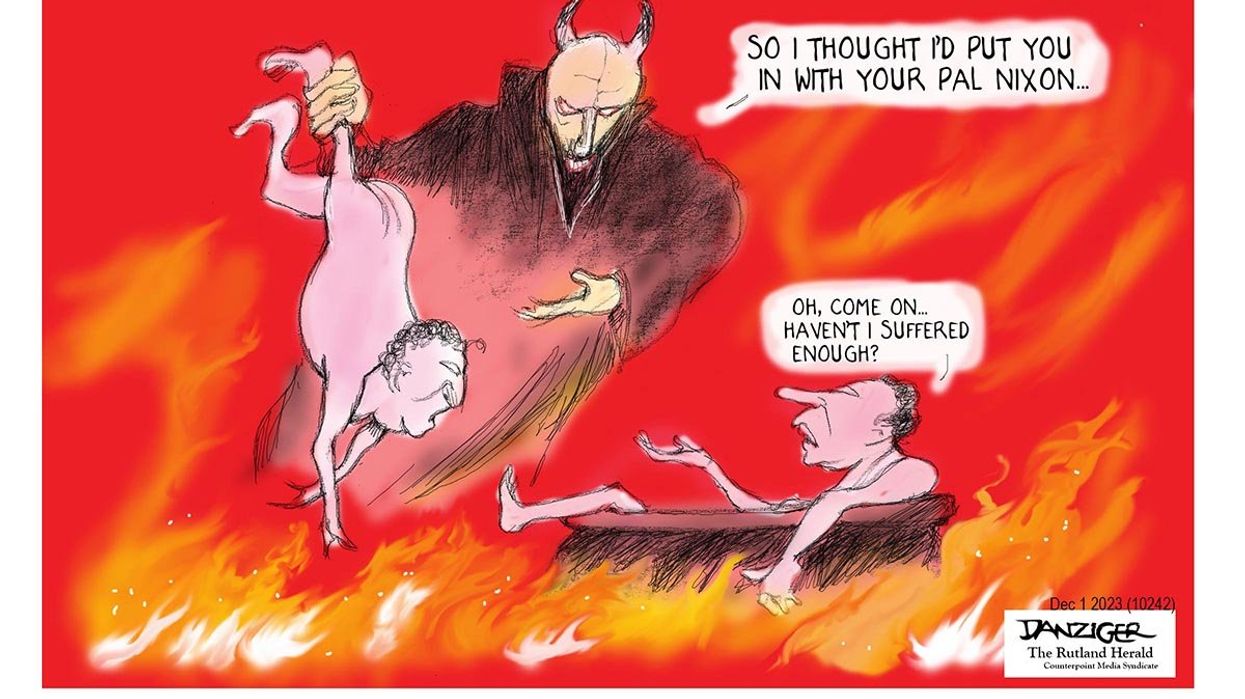As the dust settles over Election Day, it’s worth reflecting that it’s not only the election results that have been at stake, but the future of the presidency and its powers. Over the course of the first quarter of this century, the American presidency has accumulated ever more power, rendering the office increasingly less constrained by either Congress or the courts. With Donald Trump’s reelection, the slide toward a dangerously empowered president has reached a moment of reckoning, particularly when it comes to foreign affairs and warfare.
Throughout American history, presidents have repeatedly sought to increase their powers, nowhere more so than in the context of war. As historian James Patterson has pointed out, “War and the threat of war were major sources of presidential power from the beginning.” Whether it was George Washington’s insistence that he was the one to formulate foreign policy when it came to diplomacy, treaties, and more; Thomas Jefferson’s assertion of complete control over whether or not to attack the Barbary Pirates; James Polk’s decision to take actions which risked war with Mexico; or Abraham Lincoln’s “sweeping assertions of authority” in the Civil War era, executive claims to authority when it comes to matters of foreign relations and warfare have been a persistent feature of American history.
The twentieth century saw a continued rise in the powers of the presidency. As historian Jeremi Suri noted in his book The Impossible Presidency, the four terms of Franklin D. Roosevelt were a transformative moment, essentially multiplying the responsibilities of the president with the ultimate goal of “mak[ing] the national executive the dominant actor in all parts of American life.” The presidents who followed Roosevelt continued to display such enhanced powers, especially when it came to foreign affairs.
As legal scholar Matt Waxman has reminded us, FDR’s successor, Harry Truman, went to war in Korea without congressional authorization. Dwight D. Eisenhower, who did consult with Congress over the need to protect U.S.-allied Pacific coastal islands from possible Chinese aggression and, in his farewell address, warned against “the military-industrial complex,” still believed “that the president had broad powers to engage in covert warfare without specific congressional approval.” In fact, his successor, John F. Kennedy, exercised those powers in a major way in the Bay of Pigs incident. Richard Nixon unilaterally and secretly launched the invasion of Cambodia in 1970, and Ronald Reagan created a secret Central American foreign policy, while arranging the unauthorized transfer of funds and weaponry to the Nicaraguan rebels, the Contras, from the sale of U.S. arms to Iran, despite the fact that such funding was prohibited by an act of Congress, the Boland Amendment.
The Twenty-First Century
Even within the context of repeated presidential acts taken without congressional assent (or often even knowledge) and in defiance of the constitutional checks on the powers of the presidency, the twenty-first century witnessed a major uptick in claims of executive power. In the name of war, this century has seen an astonishing erosion of constraints on that very power, as Yale law professor Harold Hongju Koh details in his illuminating new book, The National Security Constitution in the Twenty-First Century.
At the dawn of this century, the attacks of September 11, 2001, led to an instant escalation of presidential power and executive unilateralism. In the name of national security, President George W. Bush issued an order that authorized the indefinite detention of prisoners in what quickly came to be known as the Global War on Terror. He also set up an offshore prison of injustice at Guantánamo Bay, Cuba, and authorized military commissions instead of federal court trials for terrorism suspects captured abroad.
Meanwhile, Congress and the courts consistently deferred to the will of the president when it came to actions taken in the name of that war on terror. One week after the attacks of 9/11, Congress passed the Authorization for the Use of Military Force (AUMF), which undermined its own power in Article I of the Constitution to declare war and weakened its powers of restraint on presidential actions carefully articulated in the 1973 War Powers Resolution (WPR), passed to guard against the very kind of secretive engagement in war that Nixon had unilaterally authorized in the Vietnam era.
Now, turning their backs on the power given them by the Constitution and the WPR, Congress, with that AUMF, acceded to the expansion of presidential powers and opened the door to the disastrous wars in Afghanistan, Iraq, and elsewhere early in this century. The president, it stated, was “authorized to use all necessary and appropriate force against those nations, organizations, or persons he determines planned, authorized, committed, or aided the terrorist attacks that occurred on September 11, 2001, or harbored such organizations or persons, in order to prevent any future acts of international terrorism against the United States by such nations, organizations, or persons.”
In October 2001, Congress also passed the USA Patriot Act. It included an expansion of presidential power at home in the name of protecting the nation in the war on terror, including authorizing greatly expanded surveillance policies that would come to include, among other things, secret surveillance and searches that took place without evidence of wrongdoing, notably in Muslim communities in this country that were considered inherently suspect in the name of the war on terror.
As a result, when, in January 2009, Barack Obama entered the White House, his administration found itself with a strikingly expanded definition of the powers of the presidency on the table.
Obama’s Presidency
A former constitutional law professor, Barack Obama pledged to overturn some of the Bush administration’s most egregious, extralegal breaches, including the very existence of the Guantánamo Bay Detention Facility and the use of torture (or what the Bush administration had politely termed “enhanced interrogation techniques”) authorized by executive unilateralism as part of the war on terror. In what became known as “trust me” government, Obama also pledged to reform the excessive surveillance policies implemented in the war on terror. In 2013, David Cole, a civil rights attorney and currently the National Legal Director of the ACLU, credited Obama with making substantial “shifts” toward restraint by formally declaring an end to many of the Bush administration’s “most aggressive assertions of executive power.”
But while Obama did indeed trim some of the most striking excesses of the Bush era, his record of presidential reform fell significantly short. Jameel Jaffer, the founding director of the Knight First Amendment Institute, for instance, disputed Cole’s claims, citing the Obama administration’s continued reliance on illegal and extralegal policies that Bush’s aggressive actions had already put in play — among them, warrantless wiretapping, indefinite detention, and the military commissions to try prisoners at Guantánamo. In addition, as Jaffer pointed out, the Obama administration frequently relied on the powers granted the presidency in that 2001 AUMF to authorize targeted lethal drone strikes globally, as in the case of the drone-killing of U.S. citizen Anwar al-Awlaki, without further congressional authorization, by expanding the definition of “imminence” in order to appear to be complying with the international rule of law.
When it came to such targeted killings — a military tactic introduced under President Bush but greatly expanded during the Obama years for strikes in Pakistan, Somalia, and Yemen — the president reserved for himself the right to have the final say in authorizing such strikes. As the New York Times reported at the time, “Nothing else in Mr. Obama’s first term has baffled liberal supporters and confounded conservative critics alike as his aggressive counterterrorism record. His actions have often remained inscrutable, obscured by awkward secrecy rules, polarized political commentary, and the president’s own deep reserve.”
Although he served as legal adviser to the Department of State in the Obama administration, in his warnings about the perils posed by the slide towards unilateral presidential powers, Harold Hongju Kou concedes that the president could have done more to curtail the Bush era enhancement of the powers of the president. “[T]he cautious Obama administration,” he writes, “succeeded in swinging the national security pendulum only part of the way back” to restraint on executive power via the courts and Congress. While the “cascade of illegality” that defined the Bush era’s war on terror was indeed somewhat addressed by Obama, it remained, Koh reminds us, “undercorrected” — including not seeking “stronger accountability for past acts of CIA torture, and the stubborn continuation of a Guantanamo detention policy.”
While President Obama adhered more closely to restraints on presidential power than his predecessor, his administration did not make the kinds of structural and procedural changes necessary to deter future presidents from following in the footsteps of the Bush administration, as we were soon to learn, since, as Koh points out, enhanced unilateral presidential and executive powers would be “sharply re-intensified” under Donald Trump.
The Trump Years
Indeed, the first Trump presidency vastly accelerated the claims of expanded presidential power. Jack Goldsmith and Bob Bauer, lawyers who worked in the Bush and Obama administrations, respectively, served, as they put it, “very different presidents” and hold “different political outlooks.” Yet they agree that the Trump administration took unchecked presidential authority to a new level. In their 2020 book, After Trump: Reconstructing the Presidency, they contended that “Donald Trump operated the presidency in ways that reveal its vulnerability to dangerous excesses of authority and dangerous weaknesses in accountability.”
And as they make all too clear, the stakes were (and remain) high. “The often-feckless Trump,” they wrote, “also revealed deeper fissures in the structure of the presidency that, we worry, a future president might choose to exploit in a fashion similar to Trump — but much more skillfully, and to even greater effect.” And with the Supreme Court’s recent decision upholding the immunity of Donald Trump for acts taken while in the Oval Office, the shackles that once tied presidential acts in wartime to Congressional authorization are arguably now fully off the table, should a president be determined to act on his or her own say-so. (As Justice Sonia Sotomayor wrote in her dissent, the ruling “will have disastrous consequences for the presidency and for our democracy,” arguing that it will, in essence, “let the President violate the law, let him exploit the trappings of his office for personal gain, let him use his official power for evil ends.”)
The Biden Years
When it comes to recognizing limits on presidential powers, President Joe Biden has had a distinctly mixed record. He immediately withdrew Trump’s executive order known as “the Muslim ban,” set out to close Guantánamo (but has not yet succeeded in doing so), rejoined the Paris climate accord, and revived international ties around the world that had been disrupted by Trump. And yet, that quintessential institutionalist, who prided himself on his ability to work with Congress, nonetheless veered in the direction of presidential unilateralism in the conduct of foreign affairs.
As Professor Koh put it: “In foreign affairs, even the longtime senator Joe Biden — who widely proclaims his love of the Senate — now operates almost entirely by executive fiat,” including a reliance on “classified policy memoranda, with minimal congressional oversight.” Overall, in fact, Biden issued more executive orders than any president since Richard Nixon. Though Biden wisely relied upon an interagency group of lawyers to advise him on national security decisions, following their advice, he issued “nonbinding political agreements, memoranda of understanding, joint communiques, and occasionally ‘executive agreements plus,’” just as Obama had done on the Paris climate accords and the Iran nuclear deal, relying on “preexisting legislative frameworks” rather than new Congressional authorizations. When it came to the war in Ukraine, Biden leaned heavily on “the coordinated use of sanctions, enhanced almost weekly post-invasion.” Most of those sanctions were set, as Koh also points out, “by executive orders and regulatory decrees,” rather than in consultation with Congress.
Our Future
A second Trump presidency will undoubtedly take unilateral presidential powers to a new level. After all, he already indicated that he might withdraw the U.S. from NATO and end support for Ukraine. Nor is Trump likely to be deterred by Congress. Reporting on Project 2025, the Heritage Foundation’s nearly 1,000-page prescription for a second Trump presidency, written primarily by former office holders in the first Trump administration, New York Times reporters Jonathan Swan, Charlie Savage, and Maggie Haberman reported that Trump “and his associates” plan to “increase the president’s authority over every part of the federal government that now operates, by either law or tradition, with any measure of independence from political interference by the White House.”
In particular, Project 2025’s stance on nuclear weapons is a reminder of just how dangerous a president who refused to be restrained by law or precedent will be. After all, in his first term in office, Trump unilaterally pulled out of the Iran nuclear deal and reimposed sanctions on that country, leading its leaders to increase its nuclear capacity. Meanwhile, the march toward nuclear confrontation has accelerated worldwide. In response, Project 2025 argues for ramping up America’s nuclear arsenal yet more. “[T]he United States manifestly needs to modernize, adapt, and expand its nuclear arsenal,” the treatise declared, in order to “deter Russia and China simultaneously,” adding that the U.S. needs to “develop a nuclear arsenal with the size, sophistication, and tailoring — including new capabilities at the theater level — to ensure that there is no circumstance in which America is exposed to serious nuclear coercion.”
Consider all of that a frightening vision of our now all-too-imminent future: a president freed from the restraints of the constitution, unchecked by Congress or the courts — or by his cabinet advisors. In the words of MSNBC’s Ali Velshi, Project 2025 has set the stage for Donald Trump to be the very opposite of what this country’s founders intended, “a king,” surrounded not by “groups of qualified experts” but by “unblinking yes-men.”
(Dis)Trust in the Presidency
The growing power of the presidency has been taking place in plain view, as unilateral powers have accumulated decade after decade in the Oval Office, while the recent choice of president has also become a grim choice about the nature and powers of the presidency itself. Notably, the rise in executive powers has coincided with a creeping distrust of government in this country. Since the early 1960s, when nearly 80 percent of Americans said they trusted government “most of the time,” the public’s faith in this country’s federal government hovers at just over 20 percent, according to the Pew Research Center. And no wonder. When the office of the president refuses to accept the checks and balances that underlie the democratic system, the country’s trust in negotiated, reasonable, and restrained outcomes understandably falls away.
Sadly, in this era, the benefits of restoring the very notion of checks and balances that birthed the nation have come to seem ever more like a quaint dream.
Copyright 2024 Karen J. Greenberg
Karen J. Greenberg is the director of the Center on National Security at Fordham Law School. She is also the editor-in-chief of the weekly Aon CNS Cyber Brief. She is the co-author with Julian Zelizer of the new book Our Nation at Risk: Election Integrity as a National Security Issue.











